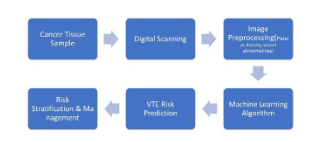Molecular and Clinicopathologic Analysis of Undifferentiated Carcinoma with Osteoclast-Like Giant Cells of the Pancreas: A Case Report Series

Keywords
UC-OGC, pancreatic cancer, KRAS G12V, molecular pathology, histopathology
Other authors: Gulrukh Botiralieva, Sayyora Shotmonova, Bakhriddin Babanov, Allayeva Kamilla
Primary affiliation: LLC Ipsum Pathology, Tashkent, Uzbekistan
Undifferentiated carcinoma with osteoclast-like giant cells (UC-OGC) of the pancreas is an extremely rare malignancy comprising less than 1% of pancreatic cancers. We present two histologically confirmed UC-OGC cases analyzed through comprehensive genomic profiling using a next-generation sequencing assay covering over 320 cancer-related genes.
Case 1 involved a 64-year-old male with a tumor in the pancreatic head. Case 2 concerned a 48-year-old male with a tumor in the pancreatic body. Both patients underwent pancreaticoduodenectomy. The first patient declined adjuvant therapy and developed liver metastases 10 months postoperatively, succumbing after 12 months. The second patient died within one month due to rapidly progressing disseminated disease.
Histologically, both tumors consisted of three characteristic cell populations: non-neoplastic osteoclast-like multinucleated giant cells, a mononuclear histiocytic component and a pleomorphic neoplastic mononuclear cell population with spindle and epithelioid morphology. The neoplastic areas showed additional foci of osteoid formation, surrounded by pleomorphic neoplastic cells and osteoclast-like giant cells—this feature illustrated in Image 1.
Immunohistochemistry revealed variable cytokeratin expression (AE1/AE3, CK7, CK8/18), diffuse p53 positivity (>50% of tumor cells), and a high Ki-67 proliferation index. CD68 staining demonstrated strong cytoplasmic positivity in multinucleated giant cells and scattered histiocytic mononuclear cells, as illustrated in Image 2.
According to molecular profiling, both patients exhibited therapeutically significant genomic alterations: KRAS (G12V), TP53 (W53*), DNMT3A (R320*, subclonal), and homozygous deletions in CDKN2A/B. Tumors were MSS with 0 Mut/Mb TMB, suggesting poor response to immunotherapy. KRAS G12V is a potential therapeutic target in emerging strategies such as RAS tricomplex inhibitors, SHP2 inhibitors, and KRAS-directed T-cell therapies. TP53 mutations may indicate potential benefit from WEE1 inhibition, and CDKN2A/B loss may suggest possible sensitivity to CDK4/6 inhibitors.
These two cases underscore the importance of combining detailed histopathological assessment with molecular profiling to uncover clinically relevant therapeutic targets in rare and aggressive pancreatic malignancies such as UC-OGC.

Image 1: H&E section, ×20 magnification. The image demonstrates pleomorphic neoplastic mononuclear cells with adjacent osteoclast-like giant cells. Note the central pale eosinophilic osteoid-like matrix surrounded by tumor cells, consistent with focal osteoid formation.

Image 2: Immunohistochemical staining for CD68 (Ventana, Roche), ×20 magnification. Strong cytoplasmic positivity is seen in multinucleated osteoclast-like giant cells and scattered histiocytic mononuclear cells.


Biography
Dr. Madina Jakhongirova is an accomplished pathologist and molecular diagnostics expert, serving as a leading consultant at LLC Ipsum Pathology—the first public-private partnership (PPP) laboratory in Uzbekistan and the country’s pioneer in providing advanced immunohistochemistry (IHC) and next-generation sequencing (NGS) services. With extensive expertise in oncopathology, she was selected to join the national focus group under WHO affiliation to develop evidence-based clinical guidelines for breast and cervical cancer. Her leadership and scientific contributions have played a central role in shaping precision oncology practices in the region. Dr. Jakhongirova completed specialized international training in India in hematologic malignancy diagnostics and continues to advocate for precision medicine by integrating histopathology with genomic technologies. She maintains active international collaborations with specialists from the United States, Russia, and other countries, further enhancing her expertise and contributing to global knowledge exchange in cancer diagnostics.
#UCJournals #PancreaticCancer #UndifferentiatedCarcinoma #OsteoclastLikeGiantCells #PancreaticTumor #CaseReport #ClinicalPathology #MolecularAnalysis #OncologyResearch #RareTumor #CancerResearch #Histopathology #TumorBiology #MedicalCaseStudy #PathologyResearch #CancerDiagnosis #PancreaticNeoplasm #ClinicalStudy #MedicalResearch #OncologyCaseReport #RareCancer #TumorPathology #CancerMolecularBiology #DiagnosticPathology #SurgicalOncology #MedicalCaseReports #CancerBiomarkers #TumorAnalysis #PathologyCase #ClinicalOncology #HistologyResearch #Oncopathology #PancreaticOncology #MolecularPathology #RareDiseaseResearch #TumorGenetics #ClinicalDiagnostics #PancreaticTumors #OncologyStudy #PathologyInsights #CancerCaseStudy #MedicalOncology #TumorCharacterization #PrecisionOncology #PancreaticHealth #CancerHistology #RareTumorResearch #TumorMolecularProfile #ClinicalPathologyResearch #PancreaticCancerResearch #OncologyInsights



